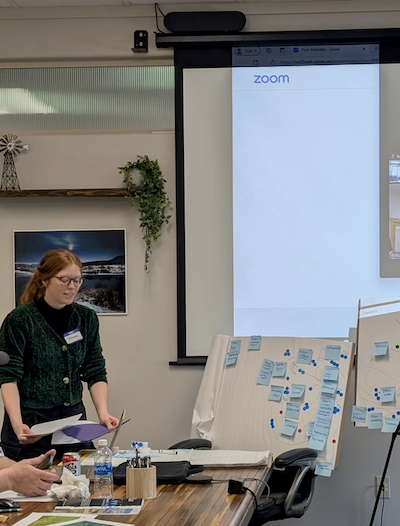Introduction
Research does not always lead to better decision-making and management, a problem known as the knowledge-action gap (Cook et al., 2013), in part because it excludes the communities experiencing the impacts and outcomes of research and resulting management decisions. Beyond being impacted by knowledge outcomes, individuals and communities also possess knowledge that can make important contributions to both science and management from different perspectives (Bartlett et al., 2012; Berkes, 2003). Uniting knowledge systems can produce a richer understanding of a system and alleviate distrust and power differentials that are associated with knowledge possession (Nadasdy, 1999).
In addition to imperfect knowledge within Western science, this project acknowledges and values multiple ways of knowing, which including both Indigenous Traditional Knowledge and the local ecological knowledge and experiences of fishermen, conservationists, local residents, and other groups who interact with the river regularly. This perspective is known as knowledge co-production, described as “the contribution of multiple knowledge sources, ways of knowing, and perspectives from different user groups with the goal of co-creating knowledge and information.” (Cooke et al., 2021). The research process involves interested parties and knowledge owners (see Box 1 for definition of terms from our 2024 paper) in activities ranging from identifying research needs to study design, data collection, interpretation, and evaluation.

Methods for knowledge co-production
Outcome 3 of this project involves documenting how different groups with extended experience with the river understand the relationships between river health and management actions. Interviews and surveys under the Community Experiences element of this project are interpreted into conceptual mappings of the relationships between objectives for the river, management actions, and the people and ecosystem processes that connect them.
The knowledge owners considered under this project, for whom separate knowledge models will be generated, are the Yurok people, conservation advocates, water users, commercial fisherman, and local residents.
Through working groups with each knowledge owner, the knowledge models will compared amongst themselves and with ecological models of river health to: a) learn more about the system being studied; b) identify points of consistency and inconsistency across knowledge models; c) foster transparency that increases understanding on rationale and outcomes; d) consider the assumptions that underlie our undertanding of a system; and d) identify key knowledge gaps within each system that contributes to uncertainty in decisions.

2024 update
Preliminary conceptual mappings have been generated for the groups with whom interviews have been completed. Interviews with the Yurok people, fishermen, and local residents are underway. Working groups with each of the knowledge owners will be conducted in spring and summer 2025.
2025 update
Curriculum: We have developed a middle-school curriculum around dams and river health that meets state requirements for Oregon and California. These materials, produced by Brook Johnson with the Yurok Tribe, provide lesson plans to educate students about the reasons dams are built, the impacts they have on water quality and fish, and the processes and people involved in removing them. The curriculum also focuses on the relationships between Northern California tribes and dams, fish, plants, and other environmental components. This curriculum is in the process of being adapted to elementary school students and has been tested in a 5th grade classroom. An OSU MS student is now in the process of combining insights from interviews with tribal members and ecological scientists to develop an additional set of two curricular modules for middle-school students: (1) changes in river ecology from dam removal; and (2) the ecological and cultural significance of Klamath River salmon.
Participatory Systems Mapping Workshops: Participatory systems mapping workshops are being conducted to identify where perceptions about water quality overlap among communities, as well as where they diverge. In 2025, we conducted two focus groups– one in Klamath Falls, OR with upper basin water users and another in Klamath, CA with Yurok Tribal members and descendants. More focus groups will be conducted in 2026. During these workshops, we are applying the principles and methods of Participatory Systems Mapping to document knowledge models of water quality, how it is impaired, the drivers of these impairments, and the results of these impairments. Unique knowledge models, essentially boxes and arrows connecting key concepts of water quality, are mapped for each of five groups: Upper and lower basin water users, upper and lower basin conservationists, and the Yurok Tribe. Models will be explored across groups to identify where perceptions overlap among communities, as well as where they diverge across communities. These focus groups are also documenting the sources of information used by the various communities in developing their perceptions (i.e. social media, lived experience, TEK, etc.). These methods were developed in a partnership between Yurok Tribal partners and OSU researchers.

Art Connection: We collaborated with Leah Wilson to explore ideas around what art can tell us about river health. Her paintings of river foam highlights how texture and shape vary at locations along the river: https://www.leahwilson.com/project/ode-eddy-muffin
We also conducted a number of community engagement activities, including field work trips to the Klamath River basin for in-person engagement with community members affected by dam removal. In addition, we participated in a multi-day engagement with Yurok Tribe researchers and community members in July 2025. Additionally, a PhD student on this project built connections with the South Coast ocean fishing community.
Knowledge co-production team

Desiree Tullos, PhD, PE (OR)
Professor, Water Resources Engineering
Oregon State University

Bryan Tilt, PhD
Professor, Anthropology
Oregon State University
Project sub-teams: Socio-cultural
Email: bryan.tilt@oregonstate.edu
Website: liberalarts.oregonstate.edu/users/bryan-tilt

Kristine Alford, PhD student
Oregon State University
Project sub-teams: Socio-Cultural; Ecology
Email: alfordkr@oregonstate.edu

Rebecca Wheaton, PhD student
Oregon State University
Project sub-teams: Socio-cultural
Email: wheatore@oregonstate.edu

Brook Thompson
Restoration Engineer & Ph.D. Student
Yurok Tribe Fisheries Design & Construction
Project sub-team: Socio-cultural
Email: brthompson@yuroktribe.nsn.us
Website: https://www.brookmthompson.com/

